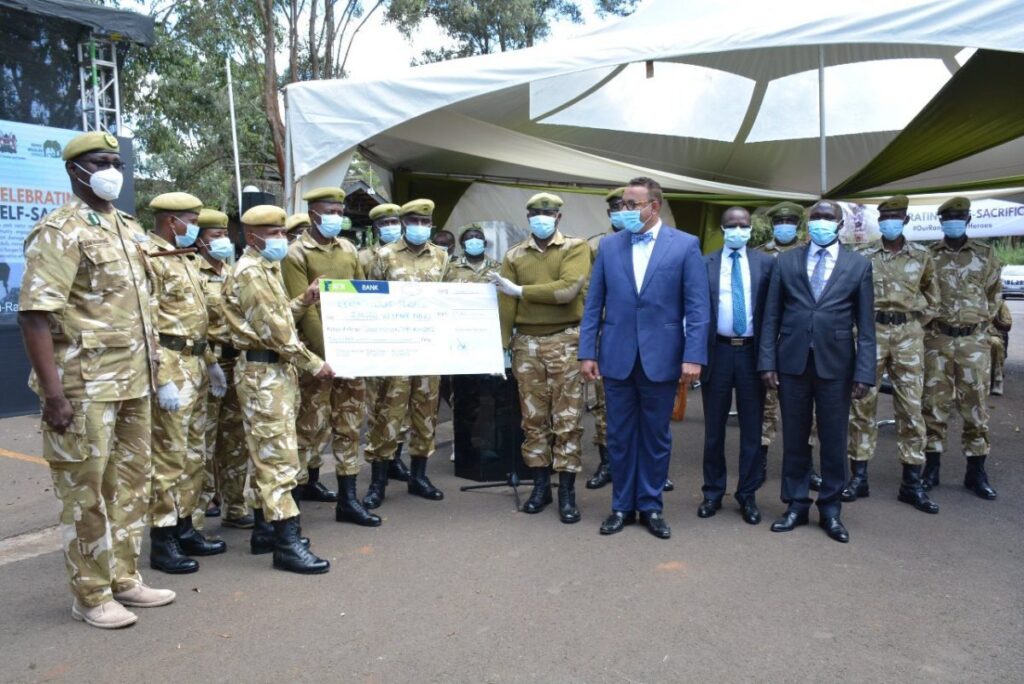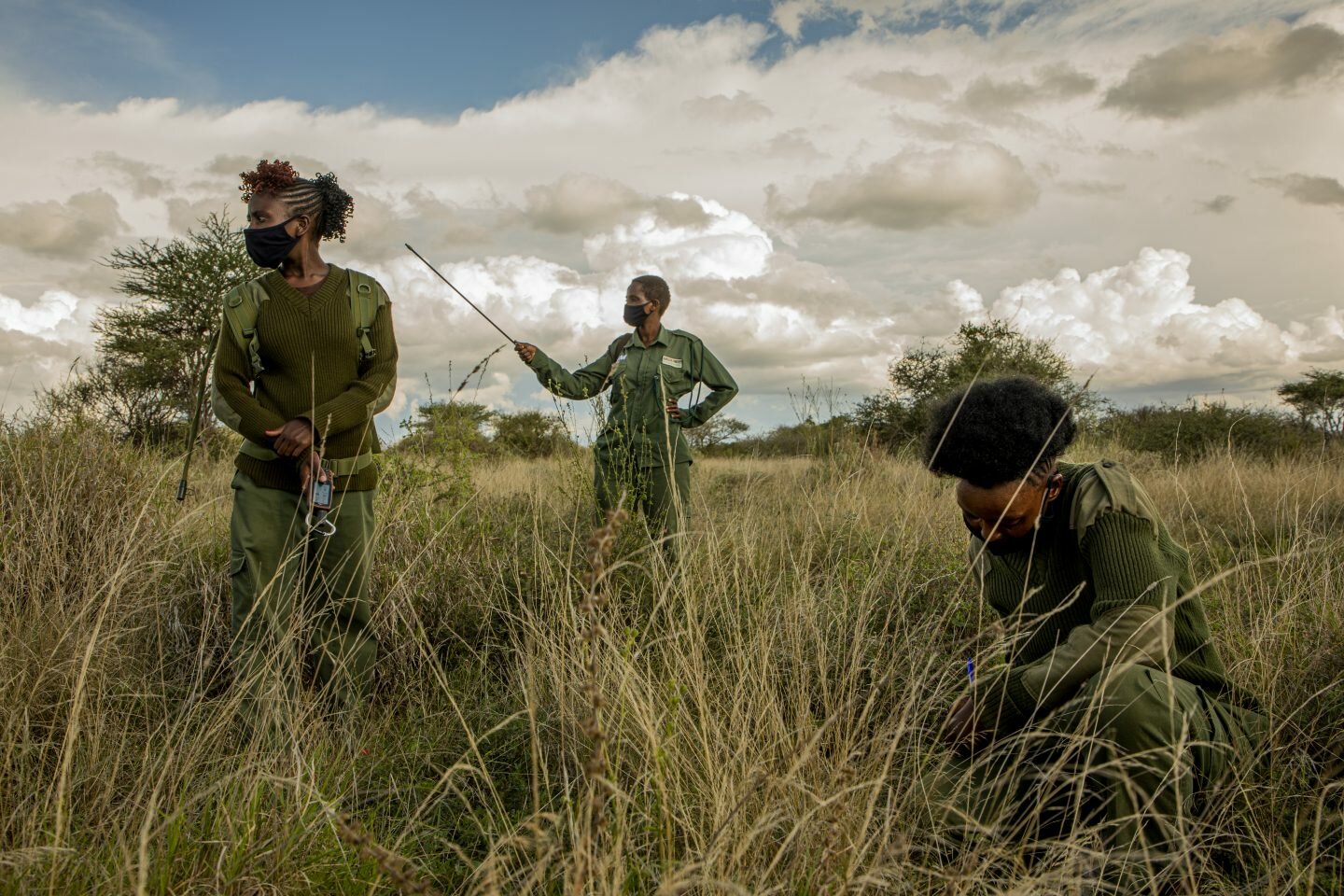African Rangers Unite As Covid-19 Jeopardises Decades Of Wildlife Protection Success

By Lawi
Kenyan wildlife rangers are set to join their counterparts across Africa today in a global fundraising campaign to protect iconic wildlife and to consolidate recent gains in conservation on the back of challenges brought by the Covid 19 Pandemic.
Ahead of the World Ranger Day slated for July 31, Kenyan rangers will commence their participation in the Wildlife Ranger Challenge (WRC) that brings together 150 ranger teams across 20 African countries to take part in a series of physical challenges starting this month and culminating in a half marathon race on 18th of September 2021.
The campaign will use the power of ranger voices, influencers and celebrities to issue a call to action to the public to support Africa’s rangers by donating to the Ranger Fund or by taking part in the Wildlife Ranger Challenge in solidarity, wherever they are in the world.

Campaign supporter and World Marathon Record Holder Eliud Kipchoge says, “As I head to the Tokyo Olympics, I wish all the wildlife rangers across Africa the best of luck as they come together for the 2021 Wildlife Ranger Challenge. Together with the organizers Tusk and Natural State, we believe wildlife rangers are critical to a strong and sustainable future for wildlife and communities. I look forward to being back in a few weeks to support and participate in the challenge together with my Lewa brothers. Good Luck and remember, No Human is Limited.”
The Covid-19 crisis has eliminated essential funding across the continent for wildlife protection that comes from tourism. The economic stresses of Covid-19 on communities, and reduced ranger presence, has resulted in an increase in poaching, but the threat is expected to increase further with ranger capacity remaining low and as international borders reopen.
WRC aims at raising about $ 5,000,000 by the time the Half Marathon (21 km) race, the highlight of the challenge takes place across the varied and challenging terrain of Africa’s Protected Areas in September. It is being organised by Tusk, and Natural State in conjunction with leading ranger associations.

Tusk’s mission is to amplify the impact of progressive conservation initiatives across Africa. The charity has earned a reputation for providing a highly efficient solution for funding wildlife conservation programmes. Natural State carry out large scale restoration projects, promote biodiversity and support measurable gains towards Sustainable Development Goals. Other partners in the WRC initiative include Scheinberg Relief Fund, Game Rangers Association of Africa and the International Ranger Federation.
Kenyan rangers are concerned that the economic effects of the COVID-19 pandemic will put their significant anti-poaching gains at risk, especially with the gradual reopening of the tourism sector and other economic activities.
Senior Wildlife Community Officer of Mount Kenya Trust, Edwin Kinyanjui says, “In the past year, rangers have had to be more vigilant than ever and enhance surveillance while repeatedly putting their lives on the line. Illegal activity due to widespread loss of income is on the rise and while combating this activity, rangers are at risk of contracting COVID-19. Poaching methods are also increasingly becoming sophisticated and the justice system overstretched. We keep going because we understand that what we are fighting for is bigger than us.”
For the first time in 21 years, the Kenya Wildlife Service (KWS) reported zero rhino’s and a record- low 11 elephants poached in 2020. However, these gains are at risk. According to Rhino Ark, tourist revenues have dropped 96% triggering budget cuts to government wildlife and forest security programs. This decrease in ranger activity is starting to see an increase in bushmeat poaching and associated crimes.

The 2nd WRC edition being launched today comes on the back of the 1st edition launched in 2020 towards the conservation of African wildlife and support of rangers. This year’s initiative is expected to consolidate and enhance gains made during the first edition. $10m was raised in 2020 to support over 9,000 rangers who collectively work to protect more than 4,000,000 km2 of conservation areas across Africa providing salaries, equipment and operating costs.
The current pressures on Africa’s protected areas threaten to compromise decades of development and conservation success. Africa’s rangers are stretched to capacity and continue to see drastic cuts in resources and an increase in poaching due to the devastating economic impact of Covid-19. A new survey, conducted by Tusk and NATURAL STATE with 60 field conservation organisations across 19 African countries, found that Wildlife Rangers see no relief in sight, as the Covid-19 pandemic continues to impact Africa’s communities and wildlife.
Sergeant Nyaradzo Hoto, International Anti-Poaching Foundation in Zimbabwe says, “COVID-19 has presented unique challenges to our Akashinga Program [in Zimbabwe]. The pandemic has significantly impacted and continues to impact, our anti-poaching operations. There has been an
alarming spike in the rate of ivory-related arrests made by our team over the last year. The poachers will not rest despite the pandemic, so it is up to us to maintain operations. This is proving a challenge, but one we’re resolving well as a team. We stand strong in our commitment to patrol the vast wilderness areas we are entrusted with and protect those that can’t fend for themselves against poachers.”
Ranger organisations from across Africa noted that if it wasn’t for the WRC, they wouldn’t have been able to cover the salaries of most of their ranger force due to serious funding cuts related to the pandemic, and efforts of many years could have been lost.
Damien Bell a representative from the Honeyguide Foundation noted “The Wildlife Ranger Challenge restored hope and helped our rangers to realize that they were not alone; that their fellow rangers throughout Africa were all experiencing similar challenges.”





